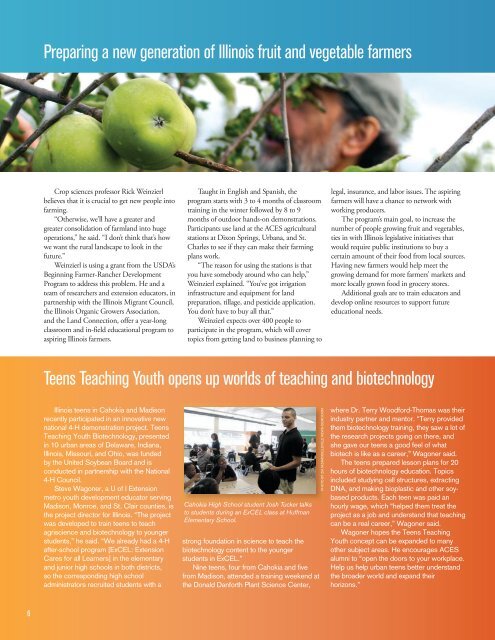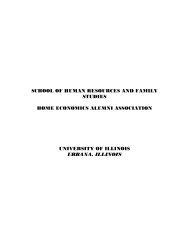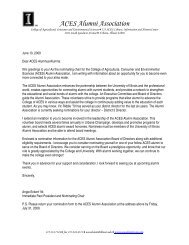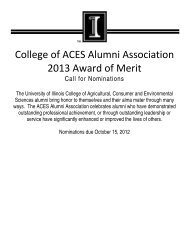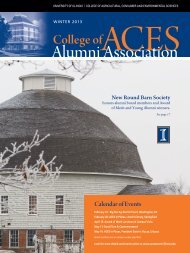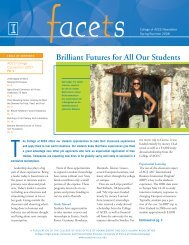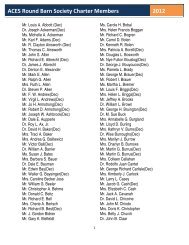Summer 2013 - ACES Alumni Association
Summer 2013 - ACES Alumni Association
Summer 2013 - ACES Alumni Association
You also want an ePaper? Increase the reach of your titles
YUMPU automatically turns print PDFs into web optimized ePapers that Google loves.
Preparing a new generation of Illinois fruit and vegetable farmers<br />
Crop sciences professor Rick Weinzierl<br />
believes that it is crucial to get new people into<br />
farming.<br />
“Otherwise, we’ll have a greater and<br />
greater consolidation of farmland into huge<br />
operations,” he said. “I don’t think that’s how<br />
we want the rural landscape to look in the<br />
future.”<br />
Weinzierl is using a grant from the USDA’s<br />
Beginning Farmer-Rancher Development<br />
Program to address this problem. He and a<br />
team of researchers and extension educators, in<br />
partnership with the Illinois Migrant Council,<br />
the Illinois Organic Growers <strong>Association</strong>,<br />
and the Land Connection, offer a year-long<br />
classroom and in-field educational program to<br />
aspiring Illinois farmers.<br />
Taught in English and Spanish, the<br />
program starts with 3 to 4 months of classroom<br />
training in the winter followed by 8 to 9<br />
months of outdoor hands-on demonstrations.<br />
Participants use land at the <strong>ACES</strong> agricultural<br />
stations at Dixon Springs, Urbana, and St.<br />
Charles to see if they can make their farming<br />
plans work.<br />
“The reason for using the stations is that<br />
you have somebody around who can help,”<br />
Weinzierl explained. “You’ve got irrigation<br />
infrastructure and equipment for land<br />
preparation, tillage, and pesticide application.<br />
You don’t have to buy all that.”<br />
Weinzierl expects over 400 people to<br />
participate in the program, which will cover<br />
topics from getting land to business planning to<br />
legal, insurance, and labor issues. The aspiring<br />
farmers will have a chance to network with<br />
working producers.<br />
The program’s main goal, to increase the<br />
number of people growing fruit and vegetables,<br />
ties in with Illinois legislative initiatives that<br />
would require public institutions to buy a<br />
certain amount of their food from local sources.<br />
Having new farmers would help meet the<br />
growing demand for more farmers’ markets and<br />
more locally grown food in grocery stores.<br />
Additional goals are to train educators and<br />
develop online resources to support future<br />
educational needs.<br />
Teens Teaching Youth opens up worlds of teaching and biotechnology<br />
Illinois teens in Cahokia and Madison<br />
recently participated in an innovative new<br />
national 4-H demonstration project. Teens<br />
Teaching Youth Biotechnology, presented<br />
in 10 urban areas of Delaware, Indiana,<br />
Illinois, Missouri, and Ohio, was funded<br />
by the United Soybean Board and is<br />
conducted in partnership with the National<br />
4-H Council.<br />
Steve Wagoner, a U of I Extension<br />
metro youth development educator serving<br />
Madison, Monroe, and St. Clair counties, is<br />
the project director for Illinois. “The project<br />
was developed to train teens to teach<br />
agriscience and biotechnology to younger<br />
students,” he said. “We already had a 4-H<br />
after-school program [ExCEL: Extension<br />
Cares for all Learners] in the elementary<br />
and junior high schools in both districts,<br />
so the corresponding high school<br />
administrators recruited students with a<br />
Cahokia High School student Josh Tucker talks<br />
to students during an ExCEL class at Huffman<br />
Elementary School.<br />
strong foundation in science to teach the<br />
biotechnology content to the younger<br />
students in ExCEL.”<br />
Nine teens, four from Cahokia and five<br />
from Madison, attended a training weekend at<br />
the Donald Danforth Plant Science Center,<br />
PHOTO BY ZIA NIZAMI/BELLEVILLE NEWS-DEMOCRAT<br />
where Dr. Terry Woodford-Thomas was their<br />
industry partner and mentor. “Terry provided<br />
them biotechnology training, they saw a lot of<br />
the research projects going on there, and<br />
she gave our teens a good feel of what<br />
biotech is like as a career,” Wagoner said.<br />
The teens prepared lesson plans for 20<br />
hours of biotechnology education. Topics<br />
included studying cell structures, extracting<br />
DNA, and making bioplastic and other soybased<br />
products. Each teen was paid an<br />
hourly wage, which “helped them treat the<br />
project as a job and understand that teaching<br />
can be a real career,” Wagoner said.<br />
Wagoner hopes the Teens Teaching<br />
Youth concept can be expanded to many<br />
other subject areas. He encourages <strong>ACES</strong><br />
alumni to “open the doors to your workplace.<br />
Help us help urban teens better understand<br />
the broader world and expand their<br />
horizons.”<br />
6


